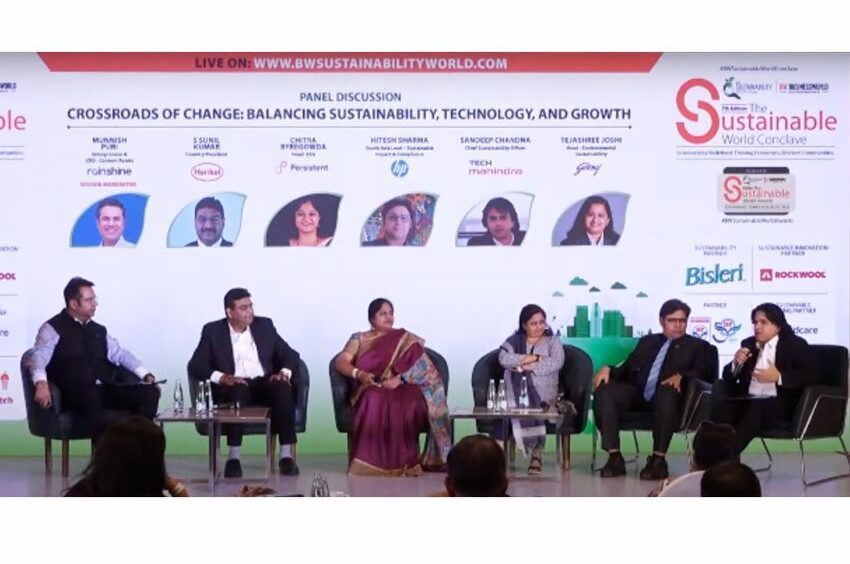Biggest Roadblock To Sustainability Is Mindset, Say Experts

From recycling concrete to AI-driven solutions, industry experts demonstrate that profitability and sustainability can coexist, stressing upon urgency, innovation and governance in the race to net zero
Byline: Reema Bhaduri
Sustainability is not just a corporate responsibility checkbox but a fundamental business imperative. From reducing carbon footprints to implementing circular economy principles, companies are proving that environmental responsibility and business growth can go hand in hand.
“Sustainability is now the lifeline for all humanity and there is no taking away from it,” says Munnish Puri, Chief Executive Officer of Content Assets at Rainshine Global. Drawing from his experience witnessing Mumbai’s transformation over the years, Puri points to tangible environmental changes. “When I came into the city around 2000, the city was very different. As the chapters of 2005-07 began, one could see air quality deteriorate and air pollution set in,” he notes, describing the gradual deterioration of air and the onset of heat waves in subsequent years.
Science-based Targets
The commitment to sustainability is increasingly becoming more structured and scientifically grounded. Tech Mahindra recently became one of 13 companies globally to have their net-zero targets approved by the Science Based Targets initiative (SBTi). Sandeep Chandna, Chief Sustainability Officer at Tech Mahindra, explains the significance commenting, “Science-based targets is a centralised agency which looks at how you are going to look at your net zero. They look at it very scientifically and yesterday publicly we have announced that our net zero targets have been firmly approved.”
Ambitious Goals
At Henkel Adhesives Technologies India, sustainability is woven into the company’s very purpose. “Henkel’s purpose is pioneers at heart for the good of generations,” explains S Sunil Kumar, Country President of Henkel Adhesives Technologies India.
The company has set ambitious goals for 2030 and 2045, particularly focusing on scope 1, 2 and 3 emissions. “By 2045, we want to achieve 90 per cent reduction on scope 1, scope 2 and scope 3,” he notes, adding that the company has maintained a consistent 3 per cent year-on-year reduction in energy, water and waste consumption since 2010, regardless of business growth.
“We have been continuously innovating and we have been proactively investing in technologies that will help in bringing down on the overall sustainability part,” Kumar adds.
At Godrej Enterprises Group, the focus is on integrating circular economy principles into product design and manufacturing processes. Tejashree Joshi, Head of Environmental Sustainability of Godrej Enterprises Group emphasises the importance of addressing sustainability at the design stage. “It’s best done at the design stage rather than retrofitting a product to be more greener,” she explains.
Joshi highlights an innovative solution to Mumbai’s construction waste problem stating, “What we have adapted is to look at how the concrete waste is recycled back as a raw material for construction and building products.” This initiative has achieved building products, with “at least 35 per cent lesser GG emissions impact because of the nature of the material.”
Technology As An Enabler
HP’s approach to sustainability demonstrates how technology can be leveraged for environmental goals. “Sustainability, if it has to be integrated, has to be seen as a system and interplaying factors to be taken care of,” says Hitesh Sharma, South Asia Lead for Sustainable Impact & Compliance at HP. The company has committed to achieving net-zero emissions across its value chain by 2040, having already reduced emissions by approximately 30 per cent by 2023.
Corporate Governance And Integration
Persistent Systems demonstrates how sustainability can be integrated at every organisational level. “First and foremost is at the leadership level, what is the commitment we have?” says Chitra Byregowda, Head of ESG at Persistent Systems. The company has established an ESG committee at the board level and involves independent directors in sustainability discussions. The integration extends to practical initiatives such as converting waste PET bottles into income-generating opportunities for underprivileged communities through NGO partnerships.
Challenges And Opportunities
The biggest challenge, according to Tech Mahindra’s Chandna, remains mindset change. “Most of the companies today face is around the mind change set because it needs a full transition from the fixed mindsets,” he notes.
HP faces different challenges, particularly in explaining the cost implications of sustainable products to customers. Sharma highlights a common misconception, “When customers ask that given that now you’re making your laptops using waste PET bottles, why don’t you make this cheaper for us?” He explains the significant investment required to create sustainable supply chains, including organising informal sector workers.
Sharma also acknowledges how HP has developed AI solutions to demonstrate the total cost of ownership and ecosystem benefits.
However, these challenges are balanced by opportunities. As Byregowda points out, companies shouldn’t wait until 2050 to take action. “Why wait till 2050 while you have your science-based target verified, approved by SBTi and become net zero by 2050. Take small little steps what you can do today,” she asserts.
The panel discussion took place at the ‘seventh edition of the BW Sustainable World Conclave’ in Mumbai.












































































































































































































































































































































































































































































































































































































































































































































































































































































































































































































































































































































































